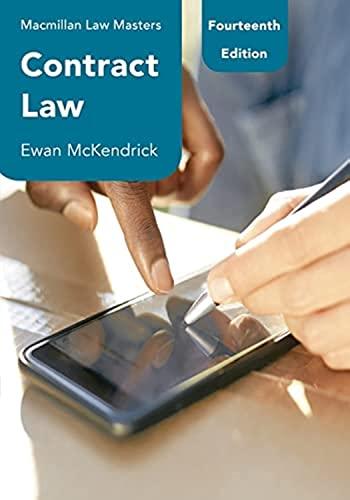Question
The firm where you work was recently hired to represent John Doe (Doe), who was expelled from Blackstone College (Blackstone). There are two (2) issues
The firm where you work was recently hired to represent John Doe ("Doe"), who was expelled from Blackstone College ("Blackstone"). There are two (2) issues your attorney wants researched. First, did Doe receive thorough, impartial, and fair procedures at Blackstone? Second, were Blackstone's procedures so unfair that the college is guilty of sexual discrimination against Doe?
On the night of February 4 - 5 of last year, Doe was so drunk that he "blacked out" and could not remember much about the night, including his interaction with Sandra Jones. The two were making out in a dormitory common area when another student said that they ought to go somewhere private. Jones led Doe to her room, where she performed oral sex on him. Her room was available because her roommate - Doe's girlfriend - was away.
Doe thought little more about the drunken night with Jones until he was dumbfounded to receive a notice from Blackstone's Office of Student Conduct ("OSC") in December of last year that he had been charged with rape. He was told to appear at a hearing scheduled for ten (10) days after the notice was received.
For that hearing, he was allowed to choose an "advisor" from a list given to him by Blackstone, but that individual could only suggest questions for the examiner, not speak for the accused or cross-examine witnesses. That list did not include anyone with the slightest legal training. The person Doe chose as his advisor was a Blackstone administrator with a degree in history, who was of no help.
The OSC decided to follow Blackstone's preferred system for adjudicating sexual assault complaints, namely hiring an investigator who would look into the case, question some witnesses, and then make a presentation to a panel appointed by the Director of the OSC. The panel would then decide on disciplinary action, if any.
The OSC insists on a minimal level of proof to find a student guilty. The evidence need only indicate that it is slightly more likely than not that the student had committed a wrongful act. In practice, this means that an accused male student will be found guilty so long as the female accuser has any credibility at all.
The panel who decided Doe's case consisted of two student-life officials from other colleges in the area and an administrator from a third college in the area whose doctorate was in Social Justice Education. Those individuals were certainly not inclined to probe deeply for weaknesses in the accuser's story or evidence that Doe had not committed any assault.
While Doe's advisor was not allowed to act as an advocate for him, the school's chosen advisor for the accuser was permitted to act as an advocate against him, and did.
Doe was found by the panel to have assaulted the female student, even though the panel found it "credible" that he was so drunk that he had little or no knowledge or control. Consequently, Doe was immediately expelled.
After his expulsion, which is now a permanent part of his academic record, Doe hired a lawyer to dig into the case. His lawyer found a great deal of evidence that Blackstone's hired investigator had not. His lawyer subpoenaed the texts that Sandra Jones had sent that night, and they utterly demolished the story she had concocted in an effort to portray herself as an innocent victim.
Those texts showed that she was desperate to cover up the fact that she had initiated sex with Doe and also that, far from feeling distraught over being assaulted, she had invited another male student she was interested in to come over and "entertain" her after she had gotten Doe out of her room.
When Doe's attorney asked it to reopen the case in light of all the new evidence he had uncovered, Blackstone refused. Doe decided to sue Blackstone in federal district court.
For the hypothetical scenario given above what would be a good research plan researched for all of the parties involved: the college, the alleged victim, and the accused?
Step by Step Solution
There are 3 Steps involved in it
Step: 1

Get Instant Access to Expert-Tailored Solutions
See step-by-step solutions with expert insights and AI powered tools for academic success
Step: 2

Step: 3

Ace Your Homework with AI
Get the answers you need in no time with our AI-driven, step-by-step assistance
Get Started


